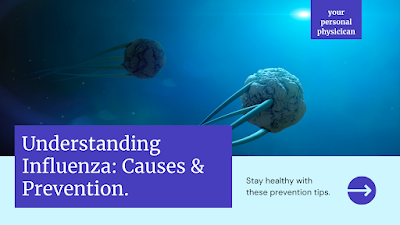Influenza: Understanding Symptoms, Causes, and Prevention
Influenza, commonly known as the flu, is a contagious respiratory illness caused by influenza viruses. It affects millions of people worldwide annually, leading to significant morbidity and mortality. Understanding its symptoms, causes, and prevention methods is crucial for effective management and control.
 |
| Influenza: Understanding Symptoms, Causes, and Prevention |
Introduction to Influenza
Influenza is a viral infection that primarily targets the respiratory system. It can range from mild to severe and, in some cases, can lead to complications such as pneumonia, especially in vulnerable populations like the elderly, young children, and individuals with underlying health conditions.
Understanding Influenza Symptoms
Common Symptoms
The symptoms of influenza typically include:
- Fever or feeling feverish/chills
- Cough
- Sore throat
- Runny or stuffy nose
- Muscle or body aches
- Fatigue
- Headaches
Less Common Symptoms
In some cases, influenza may also present less common symptoms, including:
- Vomiting and diarrhea (more common in children)
Exploring Influenza Causes
Viral Origins
Influenza viruses belong to the Orthomyxoviridae family and are categorized into types A, B, and C. Type A and B viruses are responsible for seasonal flu outbreaks, while type C viruses typically cause milder respiratory illness.
Transmission Routes
Influenza spreads through respiratory droplets when an infected person coughs, sneezes, or talks. Additionally, it can also spread by touching surfaces contaminated with the virus and then touching one's mouth, nose, or eyes.
High-Risk Factors
Certain factors increase the risk of experiencing severe complications from influenza, including:
- Age (young children and older adults)
- Chronic medical conditions (e.g., asthma, diabetes)
- Pregnancy
- Weakened immune system
Preventing Influenza
Vaccination Importance
Annual influenza vaccination is the most effective way to prevent flu infection and its complications. Vaccination not only reduces the risk of contracting the flu but also minimizes the severity of symptoms if infection occurs.
Hygiene Practices
Practicing good hygiene habits can help prevent the spread of influenza:
- Washing hands frequently with soap and water for at least 20 seconds
- Using alcohol-based hand sanitizers
- Covering mouth and nose with a tissue or elbow when coughing or sneezing
- Avoiding close contact with sick individuals
Lifestyle Habits
Maintaining a healthy lifestyle can strengthen the immune system and reduce the risk of influenza:
- Getting adequate sleep
- Eating a balanced diet rich in fruits, vegetables, and whole grains
- Exercising regularly
- Managing stress levels
Conclusion
Influenza is a significant public health concern with potentially severe consequences. Understanding its symptoms, causes, and prevention strategies is essential for minimizing its impact on individuals and communities. By adopting preventive measures such as vaccination, practicing good hygiene, and maintaining a healthy lifestyle, we can reduce the spread of influenza and protect ourselves and others from its harmful effects.
FAQs
Is the flu vaccine safe for everyone?
- Yes, the flu vaccine is safe for most people, including pregnant women, children, and older adults. However, individuals with specific allergies or medical conditions should consult their healthcare provider before getting vaccinated.
Can you get the flu from the flu vaccine?
- No, the flu vaccine contains inactivated viruses or proteins that cannot cause flu illness. However, some people may experience mild side effects such as soreness at the injection site or low-grade fever, which are temporary and not indicative of flu infection.
How long does it take for the flu vaccine to be effective?
- It takes about two weeks for the body to develop immunity after receiving the flu vaccine. Therefore, it's essential to get vaccinated before flu season begins to ensure maximum protection.
Are there any natural remedies for treating the flu?
- While there are no specific natural remedies for curing the flu, staying hydrated, getting plenty of rest, and using over-the-counter medications to alleviate symptoms can help manage the illness.
What should I do if I suspect I have the flu?
- If you experience flu-like symptoms, such as fever, cough, and body aches, it's essential to stay home, rest, and avoid close contact with others to prevent the spread of the virus. Additionally, consult your healthcare provider for guidance on symptom management and potential antiviral treatment.